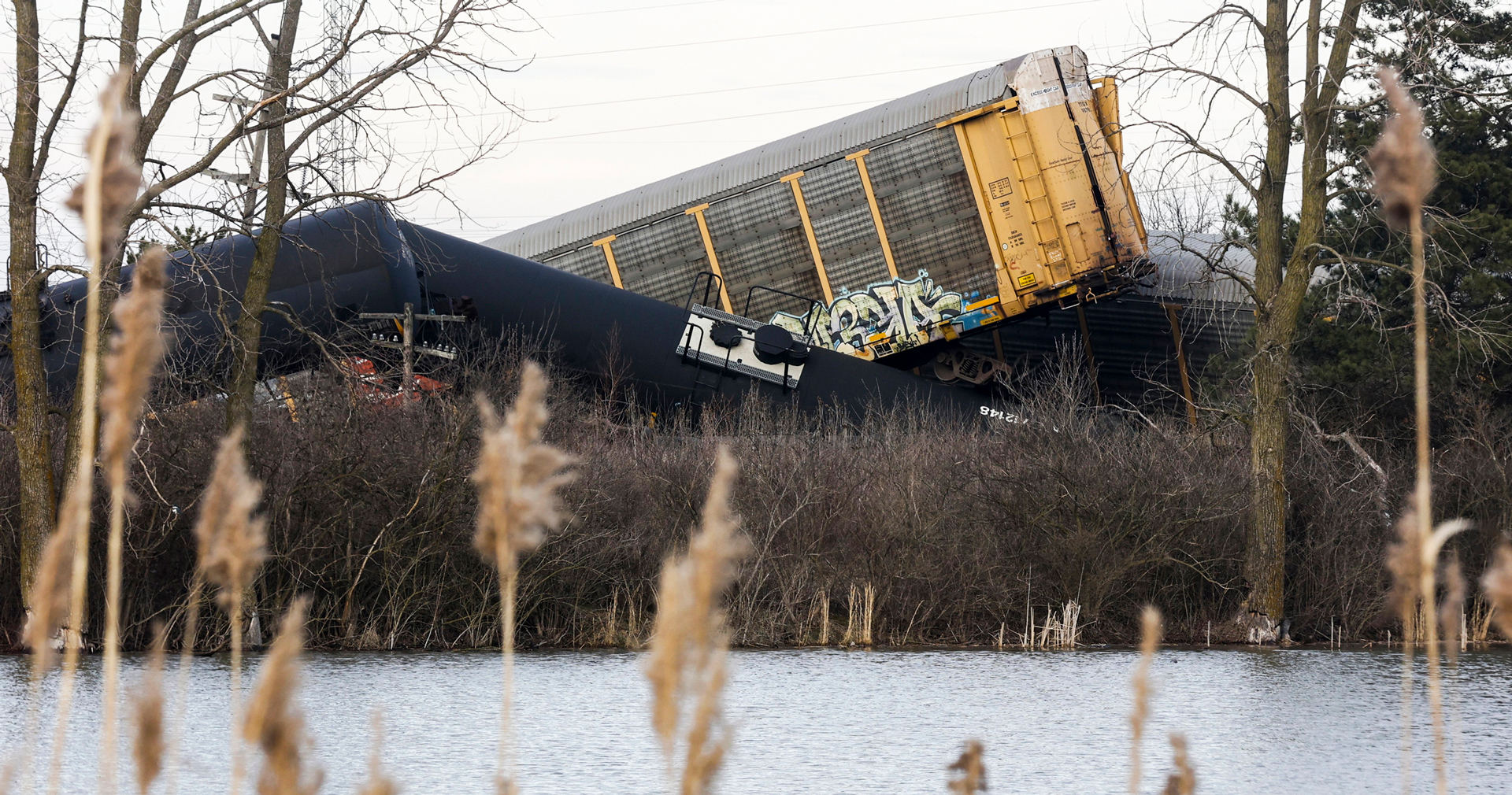ESG
Ohio
Pollution
Risk
Train
If you have been following the news, it is likely you have heard of the train derailment in East Palestine, Ohio.
A month ago, on February 3rd, a Norfolk Southern train derailed in the town, leading to an impressive wreckage and a scarier yet spillage. The spillage contained the toxic chemicals Butyle acrylate, Ethylhexyl acrylate, Ethylene glycol monobutyl, and Vinyl chloride. They were burned by the appropriate authorities as a way to control the situation and reduce the risk of explosion.
100 000 gallons, or about 450 cubic meters, were spilled alongside the tracks, contaminating the immediate area. The controlled fire, although necessary, released chemicals into the air and water. The town was evacuated, in order to protect East Palestine inhabitants. But the damage had already been done. The spillage disrupted the local ecosystem, with a recorded 40 000 fish dying in the surrounding waterways. After a week, the town was deemed “safe”, and residents were invited to come back. Despite this, water, land, and air have been contaminated with dangerous compounds, which in the long term could lead to serious health issues, such as liver cancer, and respiratory issues. The uncertainty of the situation has left residents feeling dejected and frightened.
According to Norfolk Southern, the accident was caused by overheating of the wheel bearings. Despite the train crew receiving an automated alert stating the temperature was critical and taking the appropriate emergency measures, the train still derailed during deceleration. It is important to note that the railroad companies have a hand in choosing the heat threshold, based on external factors such as the weather, and this threshold can be changed at will. This accident has led to an increased demand for regulation.
But why are people still talking about this a month later?
Beyond the tragic nature of the incident, this event is symptomatic of corporate disregard for risk. And even more importantly a blind willingness from companies to put profit above people. It would be easy to discard this as an accident of fate, a wrong place, wrong time type of situation. But alas, the railroad union had warned of an impending accident, which would be caused by a workforce stretched to its limits, longer trains, and a reduction of safety and risk inspections. In other words, this “accident”, or rather incident, was entirely preventable, had the railroad companies heeded the unions’ advice.
This incident is not the first of its kind and most definitely won’t be the last.
Wednesday 1st of March 2023, barely a month after the derailment in East Palestine, reports of a train collision come out. Two trains collided head-to-head at full speed, in the vicinity of Larissa, Greece. As one can expect from such a collision, the results were catastrophic, 57 people were killed and many more were injured or are in critical condition. This accident has left a scar on the Greek public conscience.
The Greek prime minister, Kyriakos Mitsotakis, referred to the crash as a “tragic human error”. The station master was arrested and is being charged with manslaughter and grievous bodily harm by negligence. However, the stationmaster denies these claims, and it appears that many Greeks agree. The prime minister’s comment was not well perceived by the Greek population, this accident was deemed as a tragedy that was doomed to happen and a failure on the part of the government.
Much like the situation in East Palestine, the railway workers were stretched to their limit. Proportionally to the size of the railway network, a total of 2000 employees would have been necessary to cover all needs, however, there are currently only 750 employees, meaning the company was working at full capacity with only 37.5% of needed workers. Beyond the dire lack of employees, the system was faulty and out of date. A majority of actions were manual when they should have been automated.
If the pandemic has taught us anything, is that we systematically fail to prepare ahead of emergencies.
Despite being aware of potential risks, companies and governments choose to forgo mitigating actions and substantial emergency action plans. Eventually, on a fateful day, all the conditions they had been warned about align, and mayhem ensues.
Politicians and companies will call these incidents: “unpredictable tragedies”; using the situation to gain empathy points in a mindless war for power, whilst disregarding the pain of those impacted.
Although great advancements have been made regarding risk assessment and increased precaution has been taken, these accidents keep happening and we remain unprepared.
It would appear that the S and the G in ESG are being forgotten.
100 000 gallons, or about 450 cubic meters, were spilled alongside the tracks, contaminating the immediate area. The controlled fire, although necessary, released chemicals into the air and water. The town was evacuated, in order to protect East Palestine inhabitants. But the damage had already been done. The spillage disrupted the local ecosystem, with a recorded 40 000 fish dying in the surrounding waterways. After a week, the town was deemed “safe”, and residents were invited to come back. Despite this, water, land, and air have been contaminated with dangerous compounds, which in the long term could lead to serious health issues, such as liver cancer, and respiratory issues. The uncertainty of the situation has left residents feeling dejected and frightened.
According to Norfolk Southern, the accident was caused by overheating of the wheel bearings. Despite the train crew receiving an automated alert stating the temperature was critical and taking the appropriate emergency measures, the train still derailed during deceleration. It is important to note that the railroad companies have a hand in choosing the heat threshold, based on external factors such as the weather, and this threshold can be changed at will. This accident has led to an increased demand for regulation.
But why are people still talking about this a month later?
Beyond the tragic nature of the incident, this event is symptomatic of corporate disregard for risk. And even more importantly a blind willingness from companies to put profit above people. It would be easy to discard this as an accident of fate, a wrong place, wrong time type of situation. But alas, the railroad union had warned of an impending accident, which would be caused by a workforce stretched to its limits, longer trains, and a reduction of safety and risk inspections. In other words, this “accident”, or rather incident, was entirely preventable, had the railroad companies heeded the unions’ advice.
This incident is not the first of its kind and most definitely won’t be the last.
Wednesday 1st of March 2023, barely a month after the derailment in East Palestine, reports of a train collision come out. Two trains collided head-to-head at full speed, in the vicinity of Larissa, Greece. As one can expect from such a collision, the results were catastrophic, 57 people were killed and many more were injured or are in critical condition. This accident has left a scar on the Greek public conscience.
The Greek prime minister, Kyriakos Mitsotakis, referred to the crash as a “tragic human error”. The station master was arrested and is being charged with manslaughter and grievous bodily harm by negligence. However, the stationmaster denies these claims, and it appears that many Greeks agree. The prime minister’s comment was not well perceived by the Greek population, this accident was deemed as a tragedy that was doomed to happen and a failure on the part of the government.
Much like the situation in East Palestine, the railway workers were stretched to their limit. Proportionally to the size of the railway network, a total of 2000 employees would have been necessary to cover all needs, however, there are currently only 750 employees, meaning the company was working at full capacity with only 37.5% of needed workers. Beyond the dire lack of employees, the system was faulty and out of date. A majority of actions were manual when they should have been automated.
If the pandemic has taught us anything, is that we systematically fail to prepare ahead of emergencies.
Despite being aware of potential risks, companies and governments choose to forgo mitigating actions and substantial emergency action plans. Eventually, on a fateful day, all the conditions they had been warned about align, and mayhem ensues.
Politicians and companies will call these incidents: “unpredictable tragedies”; using the situation to gain empathy points in a mindless war for power, whilst disregarding the pain of those impacted.
Although great advancements have been made regarding risk assessment and increased precaution has been taken, these accidents keep happening and we remain unprepared.
It would appear that the S and the G in ESG are being forgotten.



